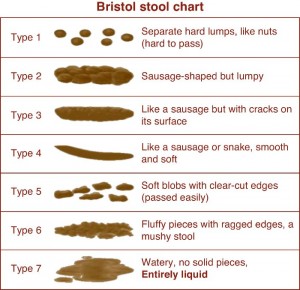The normalcy of your stools may be determined by comparing them to the Bristol Stool Form scale, or the BSF scale for short. The ‘Bristol’ in the BSF refers to the Bristol Royal Infirmary — a hospital in Bristol, England — from where this scale originated. 
It is a self-diagnostic chart designed to help shy patients discuss this delicate subject with their doctors without getting embarrassed. Although it’s not a proper medical categorization, it aids the communication process.
Fundamentally, the real worries with poop are if there’s blood present, if it’s green, if it’s super stinky, or if you’re constipated for a long time.
If there’s blood present – get to a doctor ASAP. There are a number of reasons for bloody stools and a few of them are serious like colon cancer, so get it checked out. (Beets will turn your poop red but it’s not bright and shiny like blood.) Black poop can be as sign of blood in the stomach (that’s not good) or an excess of iron; while white or grey stools may be the result of a bile duct blockage or liver disease.
Poop is brown because bile from your gall bladder is metabolized by the bacteria in your intestines as your food is broken down over the few days it spends in your guts. If you have diarrhea, the system passes the broken down food through the system too quickly to be processed and it tends towards a green hue upon excretion. If it’s green all the time and you can’t account for it through your diet, it could be a gall bladder issue.
Smells can be related to the liver and a too fatty diet. As usual, the doctors advise reducing your intake of saturated fats and increasing the amount of whole grains and vegetables you eat.
Constipation is rarely serious and can usually be fixed by eating more roughage (fiber), using stool softeners, drinking more water, or taking laxatives for a short time. But when there are complications from chronic constipation they include:
- Swollen veins in your anus (hemorrhoids). Straining to have a bowel movement may cause swelling in the veins in and around your anus.
- Torn skin in your anus (anal fissure). A large or hard stool can cause tiny tears in the anus.
- Stool that can’t be expelled (fecal impaction). Chronic constipation may cause an accumulation of hardened stool that gets stuck in your intestines.
- Intestine that protrudes from the anus (rectal prolapse). Straining to have a bowel movement can cause a small amount of the rectum to stretch and protrude from the anus.
 The Squirrel says: About 3/4 of an average piece of poop is made of water. Of the remaining 1/4, about 1/3 of it is dead bacteria from your intestines; another 1/3 is fibrous matter; the remaining amount is made up of fats, phosphates, living bacteria, dead cells, mucus, protein, etc.
The Squirrel says: About 3/4 of an average piece of poop is made of water. Of the remaining 1/4, about 1/3 of it is dead bacteria from your intestines; another 1/3 is fibrous matter; the remaining amount is made up of fats, phosphates, living bacteria, dead cells, mucus, protein, etc.
